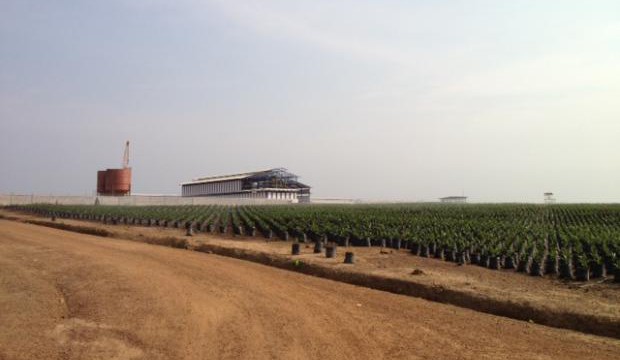
In the small rural chiefdom of Sahn Malen, in the southern district of Pujehun, a vast agricultural project has been undertaken by a company that is making a difference and proving critics wrong about claims of rampant land-grabbing, by multi-national companies, who invest in mining and agriculture, with its attendant capital flight and impoverishment of local communities.
There has been particularly strong criticism of land being taken away from the people for bio-fuel production leaving the people hungry and desolate. But SOCFIN Agricultural Company, which commenced operations in 2011, has launched a capital-intensive project, in Sahn Malen, focusing mainly on palm oil production.
Even though production is yet to commence, the company has already cultivated a little over 7,000 hectares, with the aim of reaching its projected target of 12,000 hectares. While the nursing of palm trees is underway, the company has set about constructing what is expected to be the biggest palm oil mill in Africa and arguably one of the largest in the world.
The cost of the mill is put at US$ 25 million and upon completion, in two years, this will ease the burden on the country’s economy and also guarantee enough palm oil, for local consumption. Sierra Leone currently spends approximately US$ 150 million per annum, on importation of edible oil, according to sources. For a country with a lop-sided and donor-driven economy, SOCFIN is a success story in the making.
One major criticism levied against multi-national companies operating in the country is the apparent neglect of their corporate social responsibility. There have been protests and demonstrations in many communities hosting some of these companies, bothering on this issue and these have often been met with police high-handedness and brutality. Fatalities have also been recorded.
SOCFIN, for its part, takes its corporate social responsibility very seriously. NEWSWATCH team of investigators visited the project site and saw firsthand the response of the company to the needs of the community people. The company has constructed the 42 kilometre road from Koribondo to Sahn Malen and a stretch of 31 kilometre road network across the chiefdom itself. These had become virtually unusable and rickety in the past years.
The Paramount Chief of Sahn Malen, who doubles as a Member of Parliament, Brima VS Kebbie, told the NEWSWATCH team that the local people voluntarily leased out their lands and are pretty happy with the deal.
”We requested SOCFIN to come to Sahn Malen because our farmlands were a waste and had become habitat for dangerous animals. Today, we benefit from roads they have constructed; they have built and equipped schools, dished out scholarships to our children, pay local tax for all adult residents and, most amazingly, we now have street lights in Sahn Malen,” PC Kebbie proudly explained.
SOCFIN is also cultivating a vast and sprawling acreage of rice farm for the local people. It is expected that at harvest time, the produce will feed the entire community and even outlying villages and towns. Rice is Sierra Leone’s staple food and palm oil a normal ingredient.
There has been no shortage in allegations of land-grabbing from locals in areas where multi-national companies invest. However, in Sahn Malen, most land-owners we spoke to said they willingly leased out their lands and are happy with the terms and conditions.
Emmanuel Kuyateh, a land-owner who doubles as Head Teacher of the local primary school said “My family unanimously agreed to lease our farmland to SOCFIN for 50 years and we are happy.” He pointed at the new structures sprouting out across the chiefdom, the construction of public toilets and the creation of jobs for locals, as a major gain for a community that is hugely deprived. He said life has improved for his people.
The company currently employs more than 4,000 direct and indirect workers and pays salaries in the region of 1 Billion Leones monthly, according to the Human Resource Manager Abu Amara, who incidentally is a native from the community. And this workforce is recruited from the very area of SOCFIN operation. There is potential for more jobs for locals as the project develops, Vincent Bo Collion, the French-born financial manager and current acting general manager of the company disclosed.
Sierra Leone emerged from an 11-year long brutal and devastating civil war, in 2002, which tore it apart leaving its economy and infrastructure in ruins. The people are picking the pieces of their broken lives. The current government of President Ernest Bai Koroma, on assuming office in 2007, rolled out its developmental blueprint called the “Agenda for Change” which has agriculture as a key pillar.
Many analysts believe the SOCFIN agricultural project in Sahn Malen, in the Pujehun District, is a pace-setter and a compliment to the President’s agenda. The country was recently rated the hungriest in the region, but with such a turn-around, there is clearly hope in sight.